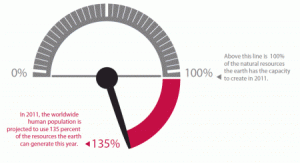Super Bowl Extravagance or Big Family Indulgence? Choose One
Sunday over 100 million people were glued to television screens in 232 countries watching the Seattle Seahawks humiliate the Denver Broncos in the Super Bowl. Tens of thousands flew to New York to see the rout in person and participate in a week of parties and promotional events. 80,000 spectators packed MetLife Stadium, drinking their share of the 325 million gallons of beer Americans drank during the game, and eating their share of the 1 billion chicken wings consumed that day.
 I found myself wondering what the total carbon footprint of this big sporting event might be. Of course I’m really curious about the entire ecological footprint, but just gauging the carbon footprint might give us an idea of the price our ecosystems pay for a major sporting event.
I found myself wondering what the total carbon footprint of this big sporting event might be. Of course I’m really curious about the entire ecological footprint, but just gauging the carbon footprint might give us an idea of the price our ecosystems pay for a major sporting event.
Just how much planet-punishing power does a Super Bowl pack? Reports vary, but apparently the last time the NFL commissioned a study, almost ten years ago, it was estimated the event was responsible for 500 tons of CO2 emissions. That was just for activities at the event and in the area where the game was played. It didn’t include emissions from the jet travel of teams, fans and media. Nor did it include emissions from powering the millions of televisions worldwide or manufacturing the 7.7 million new TV sets purchased this year to view the game.
Super Bowl Sunday is the second-largest single day of food consumption of the year (behind Thanksgiving in the U.S.). Add that to the energy consumption and CO2 tally. And here are some interesting facts from the 2009 Super Bowl:
- It used enough energy to power 1500 homes for a year.
- Stadium activities alone accounted for 310 tons of CO2.
- Fans purchased 2.9 million high definition televisions just to watch the game (the number climbs each year).
- 10 million kilowatts of electricity per hour were required to power all the televisions tuned to the game.
- The event’s economic footprint ranked it higher than the GDP of 25 nations.
All this could be worse if the NFL hadn’t been working hard for years to green up the event. In this day and age, knowing what we know about climate change, I’m continually astonished that many people in the U.S. think nothing of flying across the country to attend a sporting event or concert.
Why go through this exercise? I’m not suggesting we hereby cancel all future Super Bowls, World Cups and the like in order to be better environmental stewards. I do want to point out, however, that we’ll have to do this soon enough if we insist on continuing to ignore the perils of overpopulation. Here’s why:
 Throughout the last 200 years humankind has been on a binge. Fossil fuels and industrialization launched us onto an unprecedented trajectory of economic and population growth. In 1804 world population was just 1 billion. As world population passed the 4 billion mark in the 1970s, our footprint on the planet (a product of the size of our population and the size of our economy) crossed out of the sustainable safe zone and into what I’ll call the red zone (see www.footprintnetwork.org). Think of the tachometer on a car. Most of us know better than to rev the engine up into the red zone; we know we can’t stay there.
Throughout the last 200 years humankind has been on a binge. Fossil fuels and industrialization launched us onto an unprecedented trajectory of economic and population growth. In 1804 world population was just 1 billion. As world population passed the 4 billion mark in the 1970s, our footprint on the planet (a product of the size of our population and the size of our economy) crossed out of the sustainable safe zone and into what I’ll call the red zone (see www.footprintnetwork.org). Think of the tachometer on a car. Most of us know better than to rev the engine up into the red zone; we know we can’t stay there.
Since then, we’ve been living on borrowed time. All the news about fisheries collapsing, aquifers dropping, rivers and lakes drying up, climate heating up, rainforests shrinking, deserts expanding, fertile soil disappearing and mass extinction of other species is evidence the scale of humanity has outgrown the planet.
The shit is already hitting the fan, but for many of us the negative impacts are not yet in our faces. They will be. And when they are, there will finally be a clamor to do something about it. With population and economic throughput being the two multipliers in the human impact equation, we’ll have two choices:
Reduce human population or contract our economy and live much more simply.
In truth, rather than one earth-shaking moment of decision, a lot of the changes we’re forced to make will creep into our lives slowly. In fact, they already have. As our population and economy have grown, we’ve been gradually giving up many freedoms we enjoyed when fewer of us populated the planet. A few examples come to mind:
- Wood-burning fireplaces are now banned in many population centers.
- Massive, gas-guzzling SUVs are no longer cool.
- Big houses with room to spread out, on large lots with plenty of privacy, are becoming embarrassments.
- We’re being encouraged now to give up consumption of beef.
- The convenience of bottled water is definitely not cool.
- Luxuriously long, hot showers or baths are frowned upon.
What lies ahead? What will we give up next? Here are some possibilities:
✔ Grass Lawns
✔ Swimming Pools
✔ Golf
✔ Wine
✔ Thanksgiving Feasts
✔ Ski Lifts
✔ Powerboats
✔ ATVs
✔ Air Travel
✔ Tours
✔ Air Conditioning
✔ Thermostats that can be set above 65 F
✔ Professional Sporting Events
✔ Concerts
Of course the list can go on and on. If you haven’t been paying close attention to all the signals of overshoot, you might believe this is pure fiction. Very smart people disagree.
I’ll bet more of us are willing to limit the size of our families than are willing to give up 4-wheeling in the mountains on Saturday or watching the big game on Sunday. Certainly if the choice in Atlanta in July is between air-conditioning and responsible family planning, family planning will shine.
However, we can’t wait until the last minute to address the problem of overshoot, especially if we’re going to choose the small-family solution. Family size decisions have a snowball effect (population growth is exponential). We should have wised up a hundred years ago. That opportunity is gone, but today we can choose to begin contracting our population rather than waiting until we have to start checking off many more of the joys of life as too consumptive.
I’m not saying we can start choosing small families and that will allow us to keep driving our Hummers over to the burger joint for a half-pound of grain-fed beef. And I’m not saying that simplifying our lives and consuming less doesn’t have its share of joys. But we can perhaps keep a wider array of options for joyful living open if we embrace the joy that can be had from conceiving zero, one, or at-most two children.
Dave Gardner directed the documentary GrowthBusters: Hooked on Growth, and is a founding contributor at Growth Bias Busted. Permission is granted to repost this provided it is posted in its entirety, and credit and a link back to the original source is included.
Trackback from your site.




Francesco Turco
| #
The situation is so dire that we need to decrease both consumption and population. But I think decreasing consumption can be accomplished faster, especially in overdeveloped countries. Stop flying or becoming vegan, for example, are decisions that can be made is a relatively short amount of time. Stopping population growth in countries with high birth rates is very important, anyway.
Reply
Dave Gardner
| #
Francesco, I agree with you on the need to decrease consumption and population simultaneously. Interestingly, decreasing consumption may be accomplished faster than reducing population, but all indications are the public may be more willing to reduce family size than they are to decrease consumption. Economic growth is still king, while fertility rates are coming down!
Reply
Grant
| #
http://thinkprogress.org/sports/2013/09/16/2627481/game-day-dallas-cowboys-stadium-uses-energy-liberia/
Reply
Dave Gardner
| #
Thanks for that link, Grant, to a great story about how the Dallas Cowboys use more energy on game day than the country of Liberia. Truth is, no matter how much we green up professional sporting events, in a full world it’s very likely this pastime has got to go. I’m just waiting for all the football junkies to get vasectomies and prove me wrong.
Reply
Mike Hanauer
| #
Same situation with the Olympics. In Sochi, like so many development projects, locals were ignored and isolated. And what does all that Olympic growth yield for the future — usually nothing but problems.
Reply